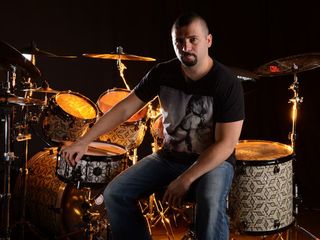
John Dolmayan picks 10 essential drum albums
It's been six years since John Dolmayan saw the inside of a recording studio, and the System Of A Down/Scars On Broadway drummer says that's entirely too long. "About a year ago, I started having a strange feeling, like something was missing from my life," he says. "I couldn’t put my finger on it at first. Finally, I realized that I hadn’t done anything artistically in a very long time, particularly concerning drumming."
With the help of longtime friend James Hazley, formerly of the band Cockeyed Ghost, Dolmayan is eyeing a return to studio recording. The two have formed a project called These Grey Men and are planning an album of covers that, in Dolmayan's view, "will push the boundaries of what you should expect from something like that."
As for the material we can expect These Grey Men to tackle, Dolmayan says that it's a wide-open field. "I have something like 10,000 songs on my phone, everything from Madonna to Radiohead to you name it. And, of course, I've got the classics. So you'll probably hear me put my own spin on things and do my own arrangements to some of the music that inspired me throughout my life."
Dolmayan has launched a Kickstarter campaign to fund the The Grey Men project, with a goal of raising $55,000 to set the recording in motion. While he admits that the notion of a well-heeled musician seeking funding from fans might raise eyebrows, he stresses that shifts in music-buying habits dictate such a move. "The bottom line is that most people don’t buy music anymore," he says. "That's a fact. So this is a way for people to invest in music they want to hear me do. And I’m an investor, too – I’ve put nearly $50,000 into this myself.”
Dolmayan offers fans various incentives in the These Grey Men Kickstarter program – signed sticks, private drum lessons, the chance to attend a recording session and even the opportunity to guest-produce a track – but he also dangles this tantalizing tease to all: "You're gonna hear me give it my all with this thing. On all my other recordings, I’ve always held back a little something on the drums to let the songs shine through. This time, I’m totally letting loose and will push the limits of what I can do. I want to inspire myself for future recordings, either with System or whatever else it might be.”
You can visit These Grey Men's Kickstarter page here. On the following pages, Dolmayan runs down what he considers to be 10 Essential Drum Albums, ranked alphabetically by artist. “Some songs from these records you might hear me do with These Grey Men – too soon to tell," he says.
Dolmayan's criterion for choosing the 10 records that make up his list was simple and to-the-point: key albums that he practiced to while developing his chops as a young drummer. "These albums make up the basic list," he explains, "but I haven't even begun to address Black Sabbath, Pink Floyd, The Police – Stewart Copeland was a huge influence on me. The only reason why I didn’t mention them is because they came later for me than these 10 records."
Which would also include The Beatles. Dolmayan calls himself an unabashed Ringo Star fan, who has little time for anybody disparaging the former Fab Four sticksman. "Ringo is a phenomenal drummer, one of the greatest of all time," he enthuses. "He took perfectly crafted songs and did exactly what they needed, but he did different stuff for each song. Anybody who says shit about Ringo, I'll punch them in the face."
Dolmayan gives it up for Charlie Watts, as well: “Easily one of the most important drummers ever," he raves. "He’s played sort of the same beat for the last 40 years, but in the beginning of his career he was very innovative." But wait, there's more: "And I have to mention Abe Cunningham, John Tempesta, Danny Carey, Dave Grohl, Chad Smith, Matt Cameron and the phenomenal 50 or 60 other drummers who have come out in the past 15 or 20 years."
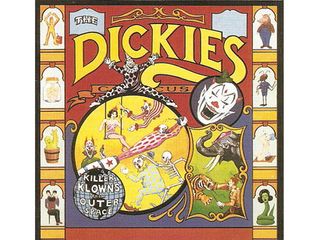
Dickies - Killer Klowns From Outer Space (1988)
“It’s funny, it’s fast, it’s irritating, and it’s really interesting. It’s the type of music that I wasn’t really into at the time, but when a friend of mine gave me a bootleg tape of the record, I checked it out and had to admit, 'Hey, this is pretty fascinating.’
“It was punk and it was fast as hell, so it taught me a lot about speed. Like Iron Maiden, the Dickies did a lot of Eastern-sounding riffs. It’s a solid record overall, and the drumming is cool.”

Al Di Meola - Elegant Gypsy (1977)
“The drumming is mind-blowing. This is some of the best fusion music I’ve ever heard. The songs are amazing, and Al Di Meola is a monster on the guitar. No doubt about it, the man’s a genius.
“There’s Spanish themes to the music and a lot of fast flamenco guitar, and like the title suggests, it’s all elegantly played. The drumming still sounds contemporary, so I have to imagine it was at the very cutting edge at the time the record was released. Fusion gets a bad rap sometimes, but this isn’t a bunch of jerk-off riffs. It’s beautifully crafted material that non-musicians can enjoy and musicians can idolize.”
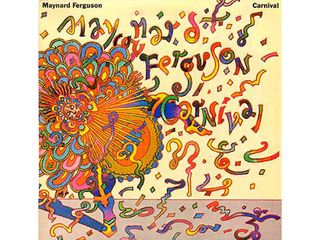
Maynard Ferguson - Carnival (1978)
“Maynard was kind of a jazz-fusion trumpet player who came up in the ‘60s and ‘70s. The music is pretty much instrumentals, and I’m not sure who the drummer was on this record, but I used to listen to this all the time. Actually, it was my father’s record, and I sort of inherited it.
“Maynard left a lot of room for the drums to explode. It’s a lot of fusion-type drumming, and it blew me away when I first heard it. I tried to play along to it, trying to get the bossa nova-type thing the drummer was doing on the kick. This was one of the primary teaching albums I had back then.”
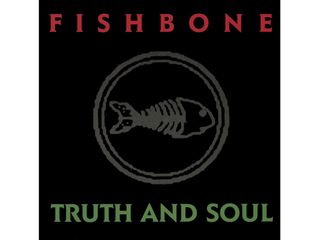
Fishbone - Truth And Soul (1988)
“Truth And Soul is the first Fishbone album I purchased. I think I still have it in my garage somewhere. It’s a great record, but the truth is, I was more into Fishbone as a live act. I used to go camping on the weekends with my friends, and then on the Monday we’d drive to the Ventura Theatre and see Fishbone.
“First time I saw them, I was like, ‘Holy shit, these guys are maniacs!’ They were progressive as hell – ska, punk, rock, you name it. I had never heard those genres before, and I certainly never imagined you could put them together like that.
“They were one of the major building blocks of my style, because I incorporate a lot of different feels and approaches. Fishbone showed me how to do that."
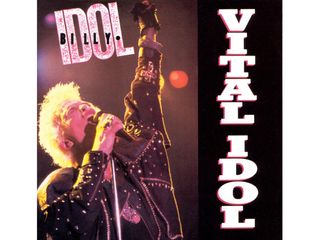
Billy Idol - Vital Idol (1985)
“It’s a greatest hits thing, and it’s just fantastic. I wasn’t much of a Billy Idol fan before I bought the album, and to be honest, the only reason I bought it was because Billy looked cool – I was, like, 16 or 17. But the second I listened to it, I was hooked. The songs were great, and the drummer was rock-solid.
“The album also taught me how important good songwriting was. The drumming wasn’t extraordinary, but it fit the material perfectly. That sounds so simple – good songs, good drumming – but it’s not.
“I probably played this album just as much as anything on the list. It taught me timing, too, the importance of which I can’t overemphasize.”
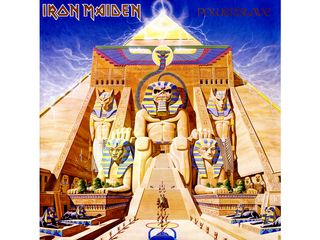
Iron Maiden - Powerslave (1984)
“A friend loaned me this album, and the first time I heard it, I absolutely hated it. I was so annoyed, like, ‘What is this stuff?’ But for some reason, I was compelled to listen again, and all at once I got it. Not only did I like it, but I loved it and thought it was completely brilliant.
“It’s dynamic, it’s interesting, and you have to give it up for Bruce Dickinson, who’s got one of the most unique voices around. Top to bottom, it’s an amazing album. I drummed along to it big-time. I’m not saying I did a good job of it, but for a 15 year old, I gave it my best.”

Led Zeppelin (box set) (1990)
“It might be kind of a cheat to pick a box set, but this was the first Led Zeppelin album I owned. To me, it’s the unofficial soundtrack to Lord Of The Rings. When I read those books for the first time, this is the music that I played. Not only were some of the songs about Lord Of The Rings or thematically tied in somehow, but the music just totally fits the story.
“John Bonham is one of the greatest drummers of all time. Feel, power, simplicity – you name it, John Bonham had it. There’s a reason why so many people say that he’s one of the best ever – ‘cause he was. Thirty years after his death, kids still have John Bonham posters on their walls. That doesn’t happen unless you really made an impact on the world and your music mattered.
“I played along to Disc Two the most. Everything on it was great – it’s almost like a brilliant crash course in Zeppelin – but the second disc got the most play from me.”
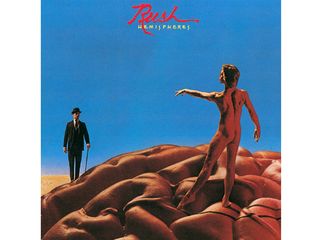
Rush - Hemispheres (1978)
“People don’t usually pick Hemispheres as their favorite Rush album, but for me, lyrically and musically, it's a masterpiece. This is music on the level of Mozart and Bach. It’s a lot to digest, but it coalesces into one image in your head.
“Oh, and it’s got some of the best drumming you’re ever gonna hear. Precision like a motherfucker, ideas that are beyond most other guys, and tremendous feel and spirit – Neil Peart can do it all. He helped to make a three-piece band sound like eight people. You can’t get better than this.”
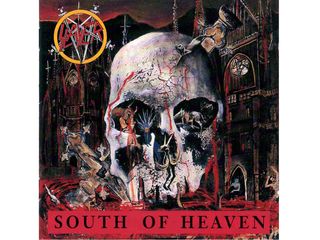
Slayer - South Of Heaven (1988)
“Not only is Dave Lombardo one of the fastest double-kick players and hardest-hitting drummers I’ve ever seen, but he’s also one of the sweetest guys around. All the guys in Slayer are amazing. God rest Jeff Hanneman’s soul – he was one wonderful guy.
“Slayer took us out for our first two tours ever. In fact, the second time we ever played outside of Los Angeles was with Slayer. They couldn’t have been more gracious or nicer to us. We idolized them and grew up listening to them, so to have them treat us well and be so cool to us was such a thrill.
“South Of Heaven was an album that I borrowed from a friend after he got into a bad car accident. I went to visit him while he was recuperating, and he had this intense music playing. ‘What’s this?’ I asked him, and he was like, ‘That’s South Of Heaven by Slayer. You don't know this record?’ He let me borrow it. I wore it out in two months and had to buy him a new copy.
“I could never play double bass like Dave Lombardo. To this day, I can’t get anywhere near it. The guy just sits down at the kicks and plays like he’s spreading butter on toast. He makes it look so easy, it’s ridiculous. And he’s not putting triggers on his kick – every hit is real.”
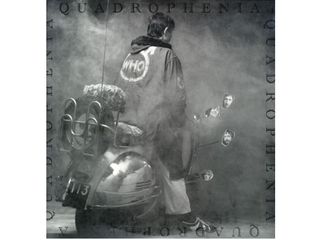
The Who - Quadrophenia (1973)
“It’s one of my all-time favorite albums. Keith Moon was one of my biggest inspirations; in fact, if you asked me to pick my favorite drummer of all time, it would be Keith Moon.
“He played on this album as if he were painting a picture. He wasn’t even playing drums; he was creating pictures and visions that would stand the test of time. From beginning to end, the songs lose nothing; they gain everything – all of it from the drumming.
“If you don’t have Keith Moon in The Who, the band is a subpar group. Sure, Pete Townshend's songs can be great, but without that drumming behind it, they don’t sail.”

Joe is a freelance journalist who has, over the past few decades, interviewed hundreds of guitarists for Guitar World, Guitar Player, MusicRadar and Classic Rock. He is also a former editor of Guitar World, contributing writer for Guitar Aficionado and VP of A&R for Island Records. He’s an enthusiastic guitarist, but he’s nowhere near the likes of the people he interviews. Surprisingly, his skills are more suited to the drums. If you need a drummer for your Beatles tribute band, look him up.
New book Dust & Grooves Vol.2 tells the tall tale of the scam records that could make collectors a fortune
![Session guitar ace Tim Pierce wears a ballcap and poses with a Powers Electric guitar [left]; a young Jon Bon Jovi rocks Super Rock 84 on Bon Jovi's first tour of Japan. His shirt is open. His hair is big. And he has a red Fender Stratocaster slung low by his hip.](https://vanilla.futurecdn.net/cyclingnews/media/img/missing-image.svg)
“Jon had the laser-focus about becoming a rock star at age 19... he knew how to negotiate the business”: Session ace Tim Pierce on his blazing solo on Bon Jovi’s Runaway – and the hunger that propelled Jon Bon Jovi to superstardom
New book Dust & Grooves Vol.2 tells the tall tale of the scam records that could make collectors a fortune
![Session guitar ace Tim Pierce wears a ballcap and poses with a Powers Electric guitar [left]; a young Jon Bon Jovi rocks Super Rock 84 on Bon Jovi's first tour of Japan. His shirt is open. His hair is big. And he has a red Fender Stratocaster slung low by his hip.](https://vanilla.futurecdn.net/cyclingnews/media/img/missing-image.svg)
“Jon had the laser-focus about becoming a rock star at age 19... he knew how to negotiate the business”: Session ace Tim Pierce on his blazing solo on Bon Jovi’s Runaway – and the hunger that propelled Jon Bon Jovi to superstardom
Most Popular






